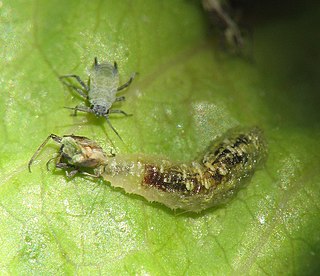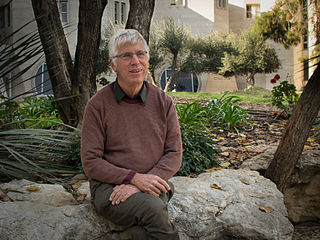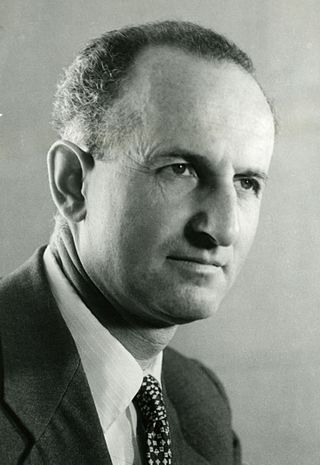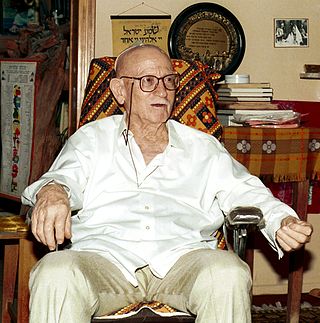Related Research Articles

Biological control or biocontrol is a method of controlling pests, whether pest animals such as insects and mites, weeds, or pathogens affecting animals or plants by using other organisms. It relies on predation, parasitism, herbivory, or other natural mechanisms, but typically also involves an active human management role. It can be an important component of integrated pest management (IPM) programs.

Etrog is the yellow citron or Citrus medica used by Jews during the week-long holiday of Sukkot as one of the four species. Together with the lulav, hadass, and aravah, the etrog is taken in hand and held or waved during specific portions of the holiday prayers. Special care is often given to selecting an etrog for the performance of the Sukkot holiday rituals. The most renowned etrogim in the world are grown in Calabria, the toe of the Italian boot. Thousands of rabbis gather there every summer to select the best fruits.

Rehovot is a city in the Central District of Israel, about 20 kilometers south of Tel Aviv. In 2021 it had a population of 147,878.

Amihai "Ami" Mazar is an Israeli archaeologist. Born in Haifa, Israel, he has been since 1994 a professor at the Institute of Archaeology of the Hebrew University of Jerusalem, holding the Eleazer Sukenik Chair in the Archaeology of Israel.

Aonidiella aurantii or red scale is an armored scale insect and a major pest of citrus. It is thought to be a native of South China but has been widely dispersed by the agency of man through the movement of infected plant material. In the United States it is known as California red scale. It was first found in California between 1868 and 1875, apparently brought there on planting material imported from Australia.

Agricultural research in Israel is based on close cooperation and interaction between scientists, consultants, farmers and agriculture-related industries. Israel's semi-arid to arid climate and shortage of high quality water are major constraints facing Israeli agriculture. Through extensive greenhouses production, vegetables, fruits and flowers are grown for export to the European markets during the winter off-season.
The University of California Citrus Experiment Station is the founding unit of the University of California, Riverside campus in Riverside, California, United States. The station contributed greatly to the cultivation of the orange and the overall agriculture industry in California. Established February 14, 1907, the station celebrated its 100th anniversary in 2007.

Ilan Chet is an Israeli microbiologist and a professor at the Hebrew University of Jerusalem, Faculty of Agriculture in Rehovot. He was appointed Deputy Secretary General of the Union of the Mediterranean in 2010 with responsibility for its Higher Education and Research Division In 2000 he was nominated for the position of President of the Weizmann Institute of Science.

Heinz Steinitz was a senior Israeli marine biologist and herpetologist, Professor and Chairman of the Department of zoology at the Hebrew University in Jerusalem. He laid the foundation for research and teaching in marine biology and oceanography in Israel. In 1968 he founded the Marine Biology Laboratory of the Hebrew University near Eilat, serving as its first director. He also served as a founding member of the Zoological Society of Israel and a co-founder of the Society for the Protection of Nature in Israel.

Pinnaspis, first described by Theodore Dru Alison Cockerell in 1892, is a genus of scale insects belonging to the family Diaspididae, or armored scale insects. There are currently 42 species within the genus Pinnaspis.

Gabriel Bach was a German-born Israeli jurist, who was a judge of the Supreme Court of Israel and was the deputy prosecutor in the prosecution of Adolf Eichmann.
Harry Scott Smith, an entomologist and professor at University of California, Riverside (UCR), was a pioneer in the field of biological pest control.
The Citrus Industry is a book consisting of five volumes of scientific and experimental information on all the citrus species and varieties, originals as well as hybrids.

Comperiella bifasciata is a parasitic wasp species in the genus Comperiella in the family Encyrtidae. It is used in biological control of California red scale and yellow scale of citrus.

Himmo, King of Jerusalem is a 1987 Israeli independent underground dramatic art film directed by Amos Guttman.

Friedrich Simon Bodenheimer or Shimon Fritz Bodenheimer was a German-born Israeli entomologist. He wrote two major works on the history of biology and is considered the founder of entomology in Israel.
Paul Hevener DeBach was an American entomologist who was a specialist on biological control. He wrote the influential book Biological Control by Natural Enemies first published in 1974 which went through several editions and helped in the development of the field of biological control.
Isaiah T. (Shy) Arkin is the Israeli Arthur Lejwa Professor of Structural Biochemistry at The Hebrew University of Jerusalem Institute of Life Sciences, Department of Biological Chemistry in Jerusalem, Israel.
Curtis Paul Clausen was an American entomologist and professor at the University of California, Riverside, who specialized in biological control. He wrote an influential text on the biology of insect predators and parasites, Entomophagous Insects (1940).

Avraham Abba Etz-Hadar (Sheinbaum) was one of the founders of the Shai, the father of pigeon contact and pigeons in the Haganah service.
References
- ↑ Rosen, David; Gerson, Uri; Applebaum, Shalom W. (1997). "In memoriam". Phytoparasitica. 25 (2): 171–174. doi:10.1007/BF02981195. S2CID 9283802.